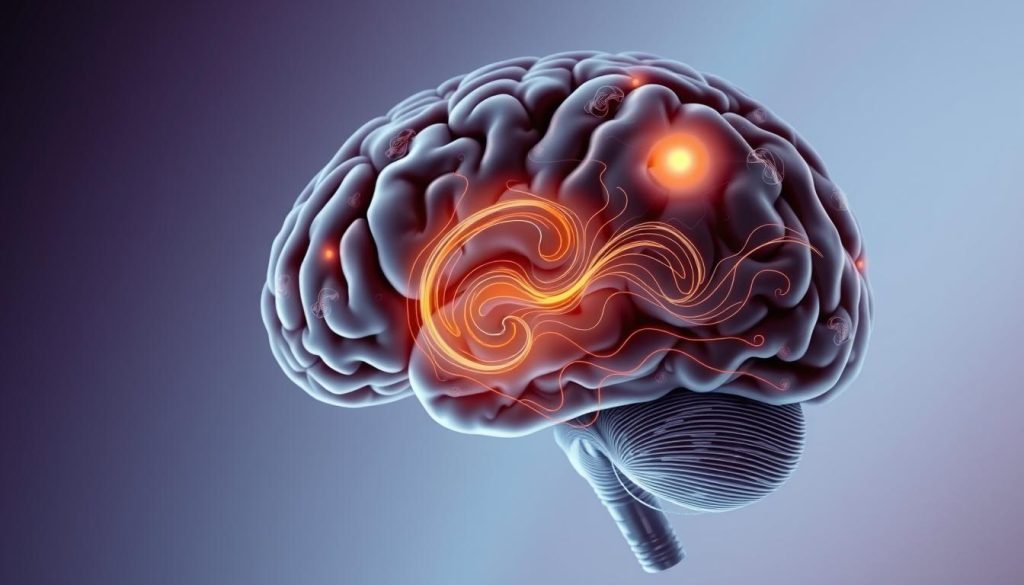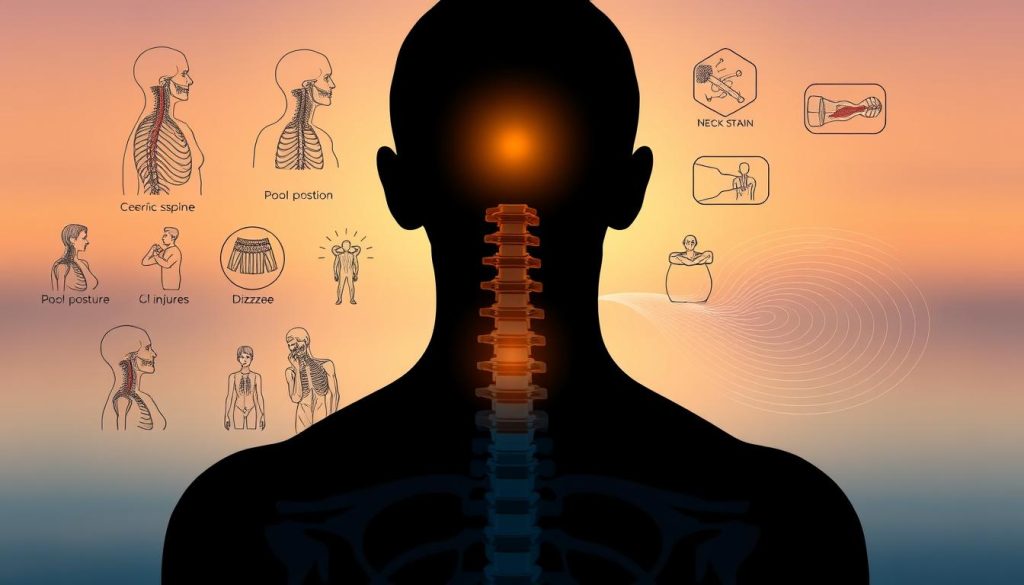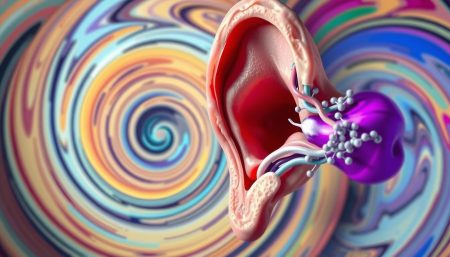Vertigo is a spinning sensation that makes you feel off-balance. It affects millions worldwide. Knowing vertigo causes and symptoms is key for the right treatment. Inner ear problems and neurological issues are just a few of the many causes.
This article looks at the main reasons for vertigo. We’ll see how different conditions affect your balance. We’ll also talk about when you should see a doctor.
Understanding vertigo’s causes helps us grasp this confusing condition. Let’s explore vertigo together and find out more about it.
Understanding Vertigo: Definition and Basic Mechanisms
Vertigo is a type of dizziness that makes you feel like you or things around you are spinning. It’s more than just feeling off-balance. Knowing what causes vertigo is crucial for managing it.
Differentiating Vertigo from General Dizziness
Dizziness is a broad term, but vertigo is different. It feels like you’re spinning, even when you’re still. Vertigo can be very intense and may cause nausea or make it hard to walk. Unlike general dizziness, vertigo usually comes from problems in the inner ear or brain.
How Your Balance System Works
Your balance system involves your inner ear, eyes, and nerves. The inner ear has fluid-filled canals that sense head movements. When this system is upset, it can cause vertigo. Common causes include infections, injuries, or disorders affecting these areas.
Types of Vertigo Sensations
Vertigo can feel different for everyone. Some feel like they’re spinning, while others feel pulled or tilted. Knowing the type of sensation can help figure out what’s causing vertigo. For example, a spinning feeling might mean inner ear issues, while a swaying sensation could suggest other problems.
- Spinning (most common)
- Tilting or leaning
- Swaying or rocking
- Feeling of being pulled to one side
Understanding these sensations can help find specific vertigo causes and treatments. If vertigo persists, seeing a healthcare professional is key. They can find the root cause and suggest the best ways to manage it.
What Can Cause Vertigo: A Comprehensive Overview
Vertigo can have many causes and symptoms. Knowing what causes vertigo is important for treatment. This overview looks at different factors that can lead to vertigo.
Inner ear problems are a big reason for vertigo. Issues like BPPV (Benign Paroxysmal Positional Vertigo) happen when tiny crystals move. Meniere’s disease, with fluid buildup in the inner ear, is another common cause.
Neurological problems can also cause vertigo. Vestibular migraines, multiple sclerosis, and brain tumors can lead to vertigo symptoms. These issues affect how the brain handles balance.
Some medicines and lifestyle choices can also cause vertigo. Certain drugs can cause vertigo as a side effect. Stress, anxiety, and bad sleep can make vertigo worse in some people.
- Cervical spine problems
- Age-related balance system changes
- Vestibular neuritis or labyrinthitis
- Head injuries or trauma
Finding the cause of vertigo is crucial for treatment. Some cases get better on their own, but others need medical help. Knowing what causes vertigo helps find the right treatment and manage symptoms.
BPPV (Benign Paroxysmal Positional Vertigo) Explained
BPPV is a common inner ear problem that causes vertigo. It happens when tiny crystals in the inner ear move out of place. This triggers sudden dizziness. Benign paroxysmal positional vertigo often occurs without a clear cause. But head injuries or balance organ issues can play a role.
Crystal Displacement in Inner Ear
The inner ear has calcium carbonate crystals that help maintain balance. When these crystals dislodge and move into the ear’s fluid-filled canals, they can cause vertigo. This displacement disrupts the normal fluid movement, sending false signals to the brain about body position.
Positional Triggers and Symptoms
BPPV symptoms typically occur with specific head movements. Common vertigo triggers and treatment scenarios include:
- Rolling over in bed
- Tilting the head back
- Bending forward
Symptoms usually last less than a minute but can be intense. They can cause nausea and loss of balance.
Diagnosis and Treatment Options
Doctors diagnose BPPV through physical exams and specialized tests. Treatment often involves repositioning maneuvers to guide the crystals back to their proper location. These exercises can provide quick relief for many patients.
| Treatment | Description | Success Rate |
|---|---|---|
| Epley Maneuver | Series of head movements to reposition crystals | 80% |
| Semont Maneuver | Rapid movement from lying on one side to the other | 70% |
| Home Exercises | Self-administered movements to manage symptoms | 60% |
While BPPV can be disruptive, understanding its causes and treatment options can help manage symptoms effectively. Regular follow-ups with healthcare providers ensure optimal management of this common vertigo condition.
Inner Ear Disorders and Vestibular Problems
The inner ear is key for balance and spatial awareness. Disorders here can cause vertigo. Inner ear issues are a common reason for vertigo.
Vestibular neuritis is a big problem. It’s inflammation of the vestibular nerve. It leads to severe vertigo, nausea, and balance trouble. Symptoms start suddenly and can last for days or weeks.
Labyrinthitis is another issue. It’s inflammation of the vestibular nerve and the labyrinth. It causes vertigo, hearing loss, and tinnitus. The vertigo can be very intense and last for weeks.
Perilymph fistula is a small tear in the ear membranes. It can cause vertigo, especially with pressure changes. This can happen during air travel or scuba diving.
| Condition | Primary Symptoms | Duration |
|---|---|---|
| Vestibular Neuritis | Severe vertigo, nausea, balance issues | Days to weeks |
| Labyrinthitis | Vertigo, hearing loss, tinnitus | Several weeks |
| Perilymph Fistula | Pressure-induced vertigo, hearing fluctuations | Variable, can be chronic |
Knowing about these inner ear disorders is key. If you have ongoing dizziness or balance issues, see a doctor. They can find the cause and help you.
Meniere’s Disease as a Major Vertigo Trigger
Meniere’s disease is a common cause of vertigo. It affects the inner ear and messes with balance. This condition can cause severe vertigo, making it a big worry for those with balance problems.
Fluid Buildup and Pressure Changes
Meniere’s disease is caused by too much fluid in the inner ear. This fluid buildup leads to pressure changes, causing vertigo. The changed fluid levels mess with the balance system, leading to intense dizzy spells.
Associated Symptoms and Warning Signs
It’s important to know the symptoms of Meniere’s disease to catch it early. Key signs include:
- Recurring vertigo episodes
- Fluctuating hearing loss
- Tinnitus (ringing in the ears)
- Feeling of fullness in the affected ear
These symptoms often show up together. They help tell Meniere’s apart from other balance disorders.
Managing Meniere’s Episodes
Dealing with Meniere’s disease needs a few steps. Changing your lifestyle, like eating less salt and avoiding stress, can help. Some people find relief in vestibular rehabilitation exercises or medication from a doctor.
“Living with Meniere’s is challenging, but understanding your triggers and having a management plan can greatly improve quality of life.”
By knowing what triggers vertigo and working with doctors, people with Meniere’s can manage their symptoms. This helps them live better, day by day.
Neurological Causes of Vertigo
Vertigo can come from many neurological conditions. This makes it harder to understand. Knowing these causes helps find treatments.
Vestibular Migraine Connections
Vestibular migraines often cause vertigo. They lead to dizziness and balance issues without headaches. People might feel like they’re spinning, be sensitive to light, and feel sick.
Things like stress, certain foods, and hormonal changes can trigger them.

Multiple Sclerosis and Balance Issues
Multiple sclerosis (MS) can damage nerve pathways, causing vertigo. This makes it hard to balance. MS vertigo often comes with vision problems or weakness.
Getting diagnosed early is important for managing these symptoms.
Brain Tumors and Vertigo Symptoms
Brain tumors are a rare but serious cause of vertigo. They can press on balance areas, causing dizziness. Other signs include headaches, vision changes, and hearing loss.
Seeing a doctor quickly is important if you have these symptoms.
| Neurological Cause | Main Symptoms | Additional Signs |
|---|---|---|
| Vestibular Migraine | Dizziness, balance problems | Light sensitivity, nausea |
| Multiple Sclerosis | Vertigo, balance issues | Vision problems, weakness |
| Brain Tumors | Persistent dizziness | Headaches, hearing loss |
Medication and Lifestyle-Related Vertigo Triggers
Vertigo can be caused by things you might not think about, like medicines and how you live. Knowing what can trigger vertigo is key to feeling better.
Some medicines can make you dizzy. This includes blood pressure drugs, antidepressants, and some antibiotics. If you start feeling dizzy while taking these, talk to your doctor right away.
How you live can also affect vertigo. Drinking too much alcohol, smoking, and too much caffeine can lead to vertigo. Not drinking enough water is another common cause that’s easy to fix.
“Many patients don’t realize that simple changes in their daily habits can significantly reduce vertigo occurrences.”
Your diet can also play a part. Eating foods high in salt or sugar can mess with the balance in your inner ear, causing vertigo. Keeping track of what you eat can help figure out what foods might be causing your vertigo.
| Category | Common Triggers | Preventive Measures |
|---|---|---|
| Medications | Blood pressure drugs, Antidepressants, Some antibiotics | Consult doctor, Adjust dosage, Consider alternatives |
| Lifestyle | Alcohol, Smoking, Caffeine, Dehydration | Moderate consumption, Quit smoking, Stay hydrated |
| Diet | High salt, High sugar, Processed foods | Balanced diet, Food diary, Avoid trigger foods |
By tackling these triggers, you can help lessen how often and how bad your vertigo gets. It’s all about making smart choices in your life and medicine.
Stress, Anxiety, and Their Impact on Vertigo
Stress and anxiety are big players in vertigo. They can make vertigo worse or even start it in some people. Knowing this helps us deal with vertigo better.
Psychological Factors in Vertigo Episodes
Stress and anxiety mess with our balance, causing vertigo. They can make our muscles tight, change how we breathe, and affect blood flow. All these can make us feel dizzy and have vertigo.
For some, worrying about vertigo can make it happen. This creates a cycle of fear and vertigo.
Stress Management Techniques
Managing stress is crucial to fight vertigo. Here are some good ways to do it:
- Deep breathing exercises
- Progressive muscle relaxation
- Mindfulness meditation
- Regular physical activity
- Adequate sleep
Using these methods can help lessen stress and maybe make vertigo less often and less severe. Remember, what works for one might not work for another. It’s all about finding what works for you.
| Stress Management Technique | Benefits for Vertigo |
|---|---|
| Deep breathing | Calms nervous system, reduces dizziness |
| Meditation | Lowers anxiety, improves balance perception |
| Regular exercise | Enhances overall balance, reduces stress |
By tackling the mind and using stress management, we can fight vertigo. These steps, along with medical help, can greatly improve life for those with vertigo.
Cervical Vertigo and Neck-Related Causes

Neck problems can surprise you with vertigo. Cervical vertigo comes from upper spine issues. It connects neck pain with dizziness.
Poor posture, injuries, or arthritis in the neck can cause vertigo. This is a lesser-known cause of dizziness.
The link between the neck and balance is complex. Neck muscles and joints send signals to the brain about head position. When these signals get disrupted, it can lead to dizziness.
Common neck-related triggers include:
- Whiplash injuries
- Herniated discs
- Cervical spondylosis
- Muscle tension from prolonged screen use
Treatment for cervical vertigo often involves addressing the underlying neck issue. Physical therapy, neck exercises, and posture correction can help. In some cases, manual therapy or medication might be necessary.
“Addressing neck problems can significantly reduce vertigo episodes in many patients.”
Prevention is key in managing cervical vertigo. Maintaining good posture, taking regular breaks from desk work, and performing neck stretches can make a difference. These simple steps can help reduce the risk of developing this type of vertigo.
| Neck-Related Vertigo Causes | Common Symptoms | Treatment Approaches |
|---|---|---|
| Whiplash | Dizziness, neck pain | Physical therapy, neck collar |
| Cervical spondylosis | Vertigo, stiffness | Exercise, pain management |
| Poor posture | Imbalance, neck strain | Posture correction, ergonomics |
Age-Related Factors Contributing to Vertigo
As we get older, our balance systems change, making vertigo more likely. Knowing these changes can help older adults stay balanced and enjoy life.
Natural Aging of Balance Systems
The vestibular system, which helps us balance, changes with age. These changes can cause vertigo in older adults:
- Decreased inner ear function
- Reduced visual acuity
- Slower reflexes and muscle responses
Prevention Strategies for Older Adults
Seniors can lower their vertigo risk with these steps:
- Regular exercise to improve balance and coordination
- Vision check-ups and proper eyewear
- Staying hydrated and maintaining a healthy diet
- Limiting alcohol and caffeine intake
Risk Assessment and Management
Knowing your vertigo risk is key to managing it. Seniors should:
- Consult with healthcare providers for personalized risk assessments
- Review medications that may contribute to dizziness
- Make home modifications to reduce fall risks
- Learn and practice vestibular rehabilitation exercises
By tackling these age-related vertigo risk factors, older adults can stay independent and cut down on vertigo episodes.
When to Seek Medical Attention for Vertigo
Vertigo can be mild or severe. If you have sudden, severe dizziness or vertigo that doesn’t go away, see a doctor. This is especially true if you also have hearing loss, ringing in the ears, or a feeling of fullness in the ear.
Get immediate medical care if vertigo comes with chest pain, trouble breathing, or severe headache. These could be signs of a serious condition. Also, watch for vision changes, weakness in your arms or legs, or trouble speaking. These might mean a stroke or other brain issues.
Regular check-ups are important if you have ongoing vertigo. Your doctor can find out what’s causing your dizziness and suggest treatments. They might send you to a specialist to find the exact cause. Remember, finding the right diagnosis is key to treating vertigo and balance disorders.
Don’t ignore persistent or worsening vertigo symptoms. Early medical attention can prevent complications and improve your life. By knowing when to seek help, you’re taking a big step in managing your health and addressing dizziness causes.
FAQ
Q: What is vertigo and how does it differ from general dizziness?
A: Vertigo is a type of dizziness where you feel like you’re spinning, even when you’re not moving. It’s different from general dizziness, which might make you feel lightheaded or unsteady. Vertigo is often caused by issues in the inner ear or brain.
Q: What are the most common causes of vertigo?
A: Common causes of vertigo include:
– BPPV (Benign Paroxysmal Positional Vertigo)
– Inner ear problems like vestibular neuritis and labyrinthitis
– Meniere’s disease
– Vestibular migraines
– Certain neurological conditions
– Side effects from some medications
– Stress and anxiety
Q: How does BPPV cause vertigo?
A: BPPV happens when tiny calcium crystals in the inner ear move into the semicircular canals. This sends false signals to the brain about head movement. It leads to brief but intense vertigo, especially with certain head movements.
Q: Can stress and anxiety trigger vertigo episodes?
A: Yes, stress and anxiety can make vertigo worse. Psychological factors can affect the vestibular system, causing dizziness and vertigo. Managing stress can help reduce vertigo episodes.
Q: What is Meniere’s disease and how does it relate to vertigo?
A: Meniere’s disease is an inner ear disorder that causes vertigo, hearing loss, tinnitus, and ear fullness. It’s thought to be caused by fluid buildup in the inner ear, leading to vertigo attacks and other symptoms.
Q: Are there any lifestyle factors that can contribute to vertigo?
A: Yes, lifestyle factors can contribute to vertigo:
– Drinking too much alcohol
– Smoking
– Poor diet and dehydration
– Not getting enough sleep or having irregular sleep
– Prolonged stress
– Certain medications
– Being too sedentary or not exercising enough
Q: How does aging affect the likelihood of experiencing vertigo?
A: As we age, our balance systems get weaker, making vertigo more likely. Older adults may have:
– Less sensitive inner ears
– Reduced blood flow to the brain and inner ear
– Weaker muscles and bones affecting balance
– Increased risk of conditions like BPPV
Regular exercise, a healthy diet, and balance training can help.
Q: Can neck problems cause vertigo?
A: Yes, neck problems can cause cervical vertigo. This can result from:
– Neck injuries (e.g., whiplash)
– Poor posture
– Cervical spine disorders
– Compressed nerves in the neck
Cervical vertigo happens when neck movements or positions disrupt sensory information to the brain, causing dizziness and vertigo.
Q: When should I seek medical attention for vertigo symptoms?
A: Seek immediate medical attention if your vertigo is severe or accompanied by:
– Sudden, severe headache
– Chest pain or irregular heartbeat
– Difficulty speaking or swallowing
– Weakness or numbness, especially on one side of the body
– Loss of consciousness
– Persistent vomiting
– New, different, or severe vertigo symptoms
– Vertigo caused by head injury
These symptoms could indicate a serious condition needing immediate medical evaluation.


















